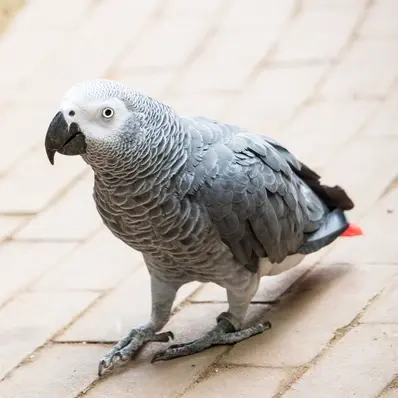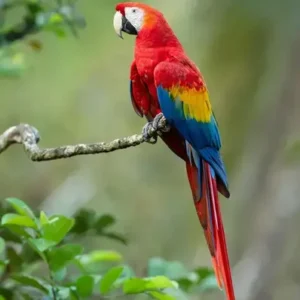African Gray Parrot Origin
African Gray Parrots originate from the dense rainforests of West and Central Africa, where they nest in tree cavities and other natural shelters. They have a rich history as one of highly intelligent birds and are known for their exceptional mimicry skills.
Moreover, they have been kept as prized companions for centuries. Currently, they are labeled as “endangered” according to the IUCN Red List. Due to natural habitat loss and increased pet trade, their numbers in the wild are reducing.
Personality
African Gray Parrots are celebrated for their unparalleled intelligence and remarkable ability to mimic human speech and various sounds. They are highly social birds, forming strong bonds with their human caregivers. These parrots thrive on mental stimulation and enjoy engaging in interactive play.
Physical Appearance
African Grey Parrots present a captivating appearance. Their vibrant red tail and a unique white mask encircling their expressive eyes increase their charm.
- Size
African Gray Parrots are medium-sized birds, ranging from 12 to 14 inches in length.
- Color
The dominant color is gray, complemented by a bright red tail and a distinctive white mask around their eyes.
Gender Differences
While there are some differences between male and female African Gray Parrots, they are not very easy to distinguish. For instance, Male African Gray Parrots are usually larger, with broader heads and thicker necks. Female African Gray Parrots are usually smaller, with slender necks and rounded heads.
Moreover, their behavior as pets is similar, so there are no significant temperamental differences between male and female Parrots.
Feed and Nutrition
Maintaining a well-balanced and nutritious diet is crucial for the health and well-being of African Grey Parrots.
Here’s what you need to provide them:
- Pellets: A high-quality pellet formulated specifically for African Grey Parrots serves as the cornerstone of their diet. These pellets are nutritionally balanced, providing essential vitamins, minerals, and amino acids. Look for pellets without artificial colors or added sugars to ensure optimal health.
- Fresh Fruits and Vegetables: Incorporate a variety of fresh fruits and vegetables into their daily diet. Offer a rainbow of colors, including leafy greens, oil palm fruit, sweet potatoes, apples, and berries. These foods provide crucial vitamins, antioxidants, and fiber.
- Nuts and Seeds: Nuts and seeds are excellent sources of healthy fats and proteins. However, they should be offered in moderation due to their high fat content. Palm nuts, Almonds, walnuts, and sunflower seeds can be provided as occasional treats.
- Cooked Legumes and Grains: Cooked legumes such as lentils and chickpeas, along with whole grains like brown rice and quinoa, contribute to the protein requirements of African Grey Parrots. Ensure these foods are well-cooked and free from additives.
- Calcium-Rich Foods: Calcium is crucial for the overall health of African Grey Parrots. Incorporate sources of calcium, such as dark leafy greens (kale, collard greens), broccoli, and calcium-enriched pellets, to support bone health.
- Hydration: Providing fresh and clean water is essential. Regularly change the water in their bowls to prevent bacterial growth. Hydration is vital for digestion and overall well-being.
- Avoid Toxic Foods: Certain foods are toxic to birds and should be strictly avoided. These include chocolate, caffeine, avocado, alcohol, and high-sodium or high-sugar foods. Always research and ensure that any new food introduced is safe for your African Grey.
Health
Keeping your bird’s health in check is important to ensure that they have a long and fulfilling life.
Here are some common health issues these Parrots face:
- Psittacosis (Parrot Fever): An infectious disease caused by the bacterium Chlamydia psittaci. Symptoms include lethargy, respiratory issues, and a decrease in appetite. Regular veterinary check-ups and a clean living environment can help prevent and manage this condition.
- Aspergillosis: A respiratory fungal infection caused by the Aspergillus fungus. Symptoms include difficulty breathing, nasal discharge, and lethargy. Maintaining a clean and dry environment, especially in their living quarters, is crucial to preventing fungal growth.
- Nutritional Deficiencies: Due to improper diet, African Grey Parrots may suffer from nutritional deficiencies. Regularly assess their diet to ensure it meets their specific nutritional requirements. Consult with a vet to address any deficiencies.
Care and Grooming
Caring for African Grey Parrots goes beyond providing a nutritious diet; it extends to creating a stimulating and safe environment that supports their physical and mental well-being.
Here are the needs and care requirements for your African Gray Parrot:
- Living Environment: Ensure the cage is spacious, allowing ample room for movement and wing stretching. Bar spacing should be appropriate to prevent accidental escapes. Place the cage in a well-lit and draft-free area. Additionally, provide a variety of bird-safe toys to keep them mentally stimulated. Rotate toys regularly to prevent boredom.
- Regular Veterinary Check-ups: Schedule regular check-ups with an avian veterinarian to monitor their health and detect any potential issues early. Discuss vaccinations, if applicable, and follow recommended parasite control measures.
- Cage Hygiene: Clean the cage regularly, removing droppings, uneaten food, and debris. Disinfect the cage periodically to prevent the buildup of harmful bacteria.
- Bathing: African Gray Parrots enjoy bathing. Provide opportunities for them to bathe, whether through misting, shallow dishes, or bird-safe bathing platforms.
- Grooming: Monitor the condition of their feathers. Regular preening is natural, but if you notice excessive plucking or changes in feather quality, consult a vet.
- Fulfill Their Sociable Nature: Spend quality time interacting with your African Grey Parrot. These social birds thrive on companionship. Provide mental stimulation through training sessions, puzzle toys, and opportunities for exploration.
Rescue Groups
If you want to get a Gray Parrot as a pet, you may check out these rescue groups that may have parrots needing a loving home.
African Gray Parrot for Sale
Buying an African Gray Parrot from a legitimate breeder or bird shop is another great option. You can check these out:
Interesting Facts
- African Gray Parrots are among the most intelligent birds in the world and have cognitive skills equal to that of a five-year-old child.
- They have an excellent ability to mimic human speech and other voices.
Best For
African Gray Parrots are best suited for experienced bird owners who have the space and resources to care for these intelligent and social birds. Moreover, as an endangered species, keeping it may require expensive legal procedures.
Top Names
| Male Gray Parrot Names | Female Pet Breed Names |
| Charlie | Bella |
| Max | Daisy |
| Oscar | Lucy |
| Rocky | Molly |
| Sam | Rosie |









